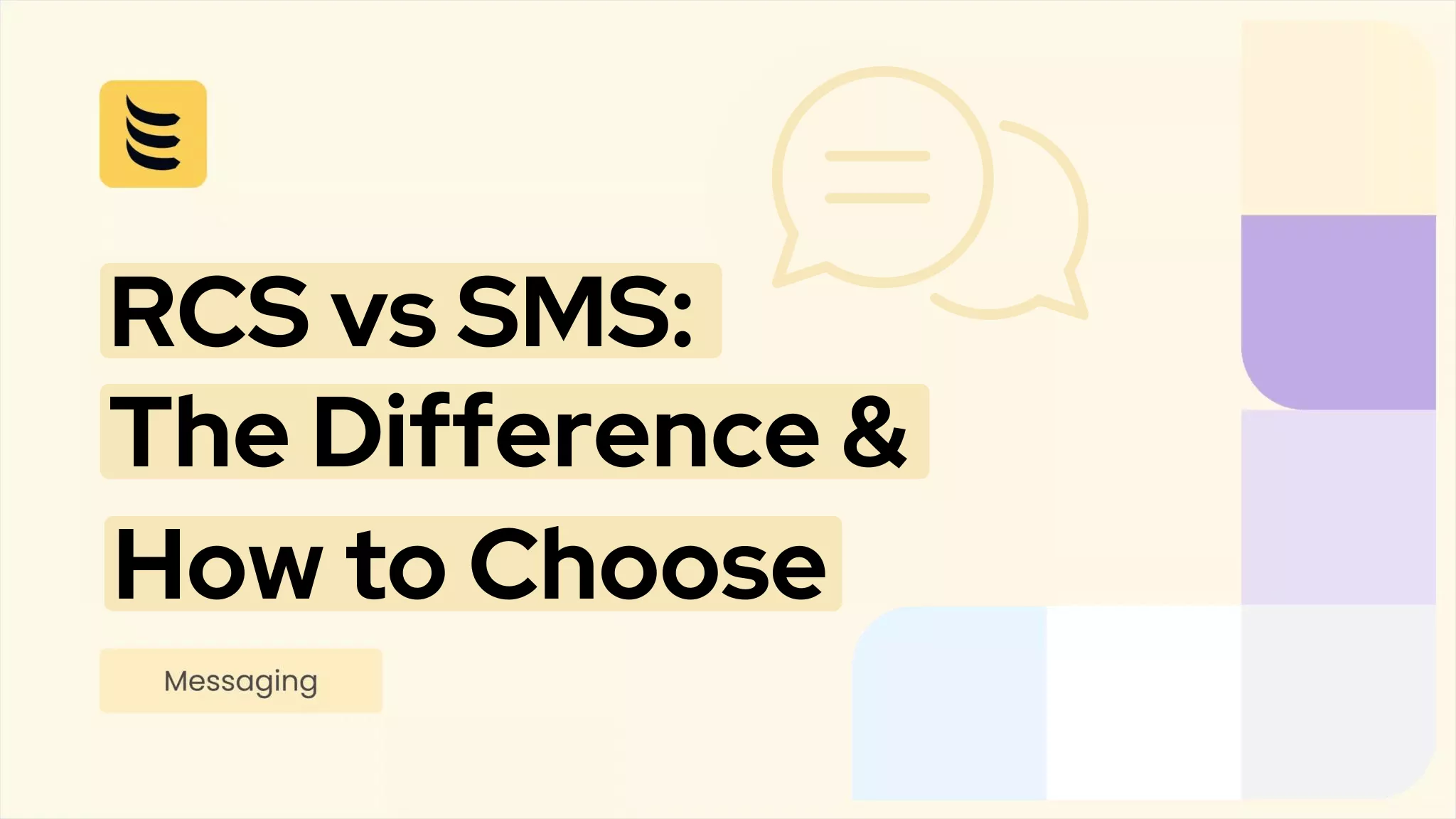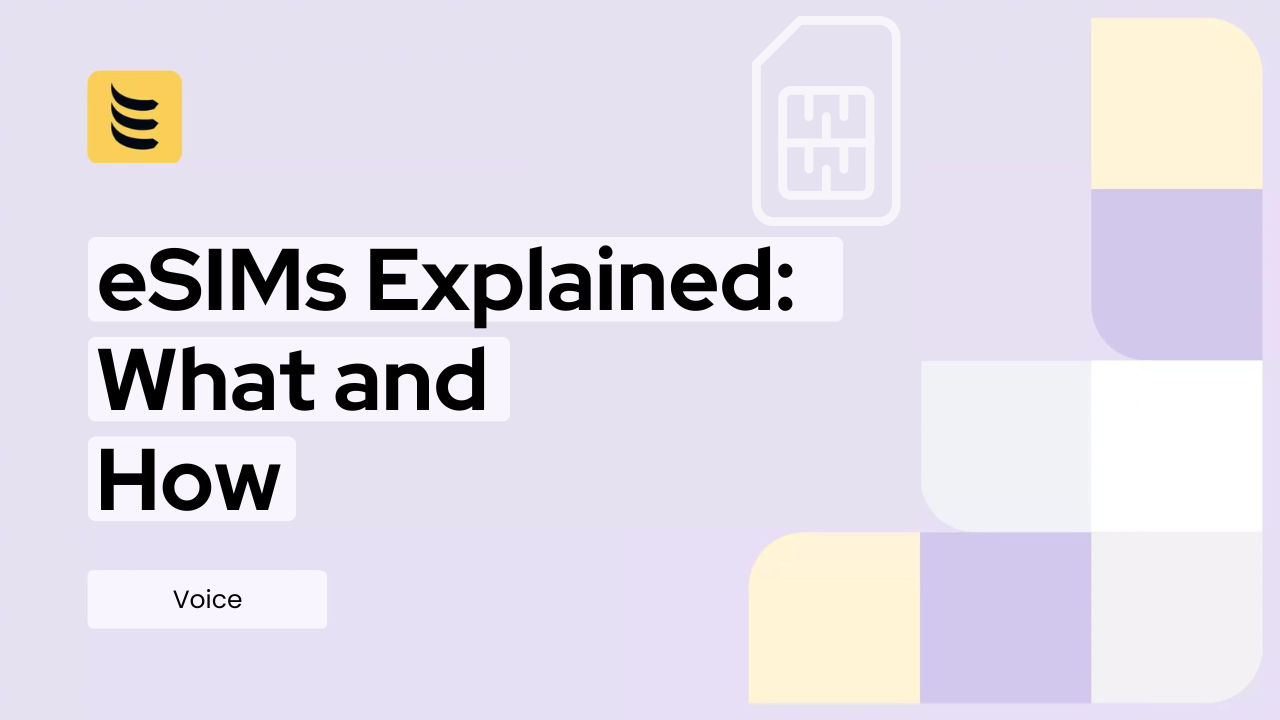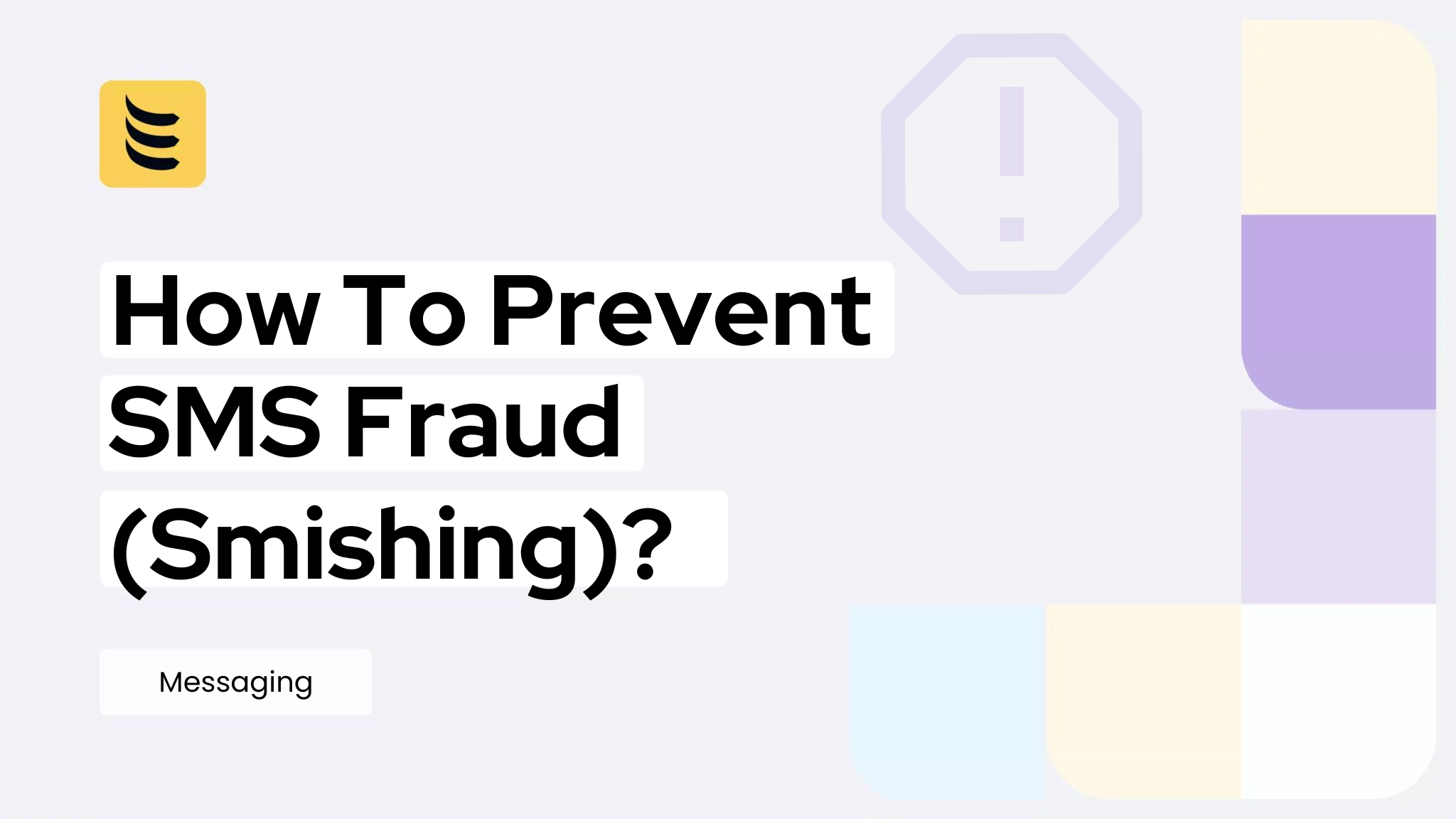Texting has become an undeniable cornerstone of modern communication. But with the constant innovation in technology, navigating the world of text messaging can be complex.
When most people think about texting, they’re likely thinking of Short Message Service (SMS), which has been the staple of the texting world for decades. However, in more recent times, a new messaging format has emerged – Rich Communication Services (RCS).
Today, SMS and RCS are the two main players that dominate the texting scene. While both facilitate texting, they offer distinct features and functionalities. Understanding these differences is crucial for choosing the most suitable option for your business needs.
This blog post serves as your guide to navigating the world of RCS and SMS. We’ll delve into their core functionalities, limitations, and underlying technologies. By the end, you’ll be equipped to make an informed decision between the two and select the texting solution that best aligns with your communication style and requirements.
What Is SMS and How Does It Work?
Short Message Service (SMS) is the veteran of the texting world. It allows the sending of short, text-only messages of up to 160 characters at a time between mobile devices.
Throughout its long history, SMS has been an efficient, highly reliable, and universal method of communication – and this reliability and universality has made it the go-to choice for many businesses for their sales, marketing, and customer service activities.
Here’s a breakdown of how SMS works:
1. Network Infrastructure:
- SMS operates on the cellular network, similar to voice calls.
- It does not rely on IP, Wi-Fi, or LTE/5G cellular access for transmission.
2. Data Usage:
- Unlike IP-based messaging platforms like RCS, WhatsApp, or Facebook Messenger, SMS does not consume mobile carrier data plans.
- SMS messages are sent directly through the cellular network without utilizing internet protocols.
3. Multimedia Messaging Service (MMS):
- MMS is an evolution of SMS, allowing the transmission of multimedia content such as images, audio, and video.
- It employs the same protocols and transport methods as SMS but accommodates larger file sizes.
- MMS is advantageous in scenarios where cellular voice access is available, but IP-based services are not.
What Is RCS and How Does It Work?
Rich Communication Services (RCS) is a protocol designed to revolutionize traditional SMS messaging, offering a more sophisticated and dynamic text-message system. With the ability to transmit multimedia content during calls, conduct phonebook polling, and share various types of media, RCS elevates the messaging experience. Notably, RCS accommodates longer messages, extending up to 8,000 characters, providing users with expanded communication capabilities.
However, despite being hailed as the advanced successor to SMS, the widespread adoption of RCS has encountered challenges. Issues such as the absence of universal standards and limitations related to devices and networks have contributed to the gradual uptake in its implementation.
Here’s a breakdown of how RCS works:
1. Connectivity Requirements:
- Devices sending and receiving RCS messaging must be connected to Wi-Fi or LTE/5G IP data network services.
- Data sent and received through RCS counts against mobile carrier data plans.
2. Emphasis on Features:
- Mobile carriers are transitioning from SMS to RCS to compete with Over-The-Top (OTT) communication apps like WhatsApp and Facebook Messenger.
- RCS offers feature-rich communication, including group chat, high-resolution media delivery, read receipts, and location sharing.
3. Open Standard:
- RCS is an open standard, allowing any device to integrate its feature-rich services without cost or interoperability concerns.
- This openness should eventually promote widespread adoption and accessibility across devices, though at present it still doesn’t compete the universality of SMS.
Recent developments in Rich Communication Services (RCS) [Nov, 2024]
Apple’s RCS Support: Apple announced that RCS would be integrated into iOS 18, enhancing communication between iPhone and Android users. Features like read receipts, typing indicators, high-quality media sharing, and messaging over WiFi are expected. This adoption aims to improve interoperability, though Apple will continue prioritizing iMessage as its primary service.
End-to-End Encryption: The GSMA is spearheading efforts to implement end-to-end encryption across RCS platforms, aiming to elevate security for cross-platform communications between Android and iPhone users. This will make RCS a more viable competitor to proprietary messaging apps.
Emergency Services Integration: Google introduced RCS support for texting emergency services like 911, allowing users to share precise location information during crises. This feature exemplifies how RCS can go beyond traditional messaging to serve critical functions.
SMS vs RCS: How do They Compare?
The primary distinction between RCS and SMS lies in their respective modes of transmission. SMS relies on the cellular network for sending and receiving messages, functioning independently of data connectivity. In contrast, RCS requires an active data connection before content can be transmitted. Although SMS remains viable in scenarios lacking data connectivity, the widespread availability of LTE and 5G has significantly expanded internet access, enhancing the capabilities of feature-rich services like RCS.
Many consider RCS to be a more convenient and versatile communication platform when compared to SMS and other Over-The-Top (OTT) alternatives such as WhatsApp, Facebook Messenger, and Telegram. Unlike third-party services that require users to be logged into the same app, RCS offers a seamless communication experience.
| SMS/MMS | RCS |
| Operator dependent Native on all phones SMS: Limited character count No rich content, just links MMS: No character limitation Rich media, such as images, GIFs and video | Telco operators need to update their network to offer it No character limitation Rich media features including images, video, and GIFs Verified Sender from operator or Google Requires a mobile data connection to send and receive messages |
What Are the Benefits of Using RCS Vs SMS?
When deciding between SMS and RCS, it’s crucial to examine four primary factors that play a pivotal role in choosing the right communication protocol.
1. Reach and Adoption
SMS boasts universal reach, making it an excellent tool for businesses to connect with almost every mobile device.
In contrast, RCS’s advanced features require newer devices and updated operating systems, limiting its reach. The manual enablement of RCS on compatible devices introduces fragmentation and inconsistency in user experience.
2. Cost and Complexity
While RCS offers a richer feature set, it comes with higher costs and increased complexity, deterring smaller businesses or those with tighter budgets.
SMS, being simple and cost-effective, is often bundled with mobile plans, making it effectively free for most users and keeping development and integration costs low for businesses.
3. Interactivity and Rich Media
RCS excels in handling rich media and interactive content, potentially boosting engagement rates.
However, this advantage is contingent on both sender and receiver having RCS enabled, a situation far from universal. SMS, while lacking rich media support, ensures simplicity, reliability, and guaranteed delivery.
4. Reliability and Security
SMS has a proven track record for reliability, functioning under less-than-ideal network conditions.
RCS, relying on data connections, is more vulnerable to network interruptions and less reliable in areas with poor data coverage. While both SMS and RCS have security vulnerabilities, RCS offers end-to-end encryption for enhanced privacy.
Recent developments in SMS technology
Recent developments in SMS technology showcase its continued evolution as a pivotal communication and marketing channel:
- Interactive and Hyper-Personalized Campaigns: SMS is transforming into a more engaging tool with interactive messaging, allowing users to participate in polls, surveys, or even transactions directly within a text. Hyper-personalization is also becoming more prevalent, with brands using detailed customer data to deliver highly tailored messages (Labs Mobile33rd Square).
- AI Integration: Generative AI is enhancing SMS campaigns by personalizing content and making them more conversational. While this improves engagement, it also raises concerns about data privacy and content integrity (Textmagic).
- 10-Digit Long Code (10DLC): Compliance-driven adoption of 10DLC enhances trust and message deliverability for application-to-person (A2P) communications. This is particularly beneficial for reducing spam and improving consumer experience (Textmagic).
- SMS Commerce: There is a growing interest in enabling direct purchases via SMS, with nearly half of businesses exploring this functionality by 2025. Early adoption is already showing promising results for retail and e-commerce (33rd Square).
- Metrics and Accessibility: Companies are placing greater emphasis on detailed campaign metrics, such as interactive engagement rates and conversion quality. Additionally, there is a push for SMS content that is accessible to users with disabilities, broadening its audience (Labs Mobile33rd Square).
- Multichannel Integration: SMS is increasingly being integrated with broader communication strategies, including email and social media, to create seamless customer journeys. It remains a go-to channel for time-sensitive and critical updates (Labs Mobile33rd Square).
Why SMS Still Retains the Edge for Business Communications
Choosing the appropriate communication protocol is of paramount importance for the seamless operation of any business. While RCS offers many advantages, a careful comparison between SMS and RCS underscores the enduring advantages of SMS in various crucial aspects.
For starters, its universal compatibility, cost-effectiveness, and unwavering reliability position SMS as the superior choice for businesses striving for efficient communication.
The unmatched universal reach of SMS ensures accessibility to virtually every mobile device, making it an invaluable tool for businesses of all sizes. Its cost-effectiveness not only simplifies budgeting but also caters to the financial constraints of small businesses and those with tighter budgets. Furthermore, the exceptional reliability of SMS guarantees message delivery under any network condition, providing a consistent and dependable communication platform.
In contrast, RCS, the emerging player in the messaging arena, pledges enticing app-like experiences enriched with rich media and interactivity. However, these appealing features come with notable limitations. The adoption rate of RCS remains low, demanding newer devices and data connections for optimal functionality. The heightened complexity and associated costs of RCS can be deterrents for many businesses, especially those mindful of budget constraints.
Consequently, SMS emerges as the preferred choice for the majority of businesses and use cases. It’s straightforward, reliable, and secure – and this all resonates with a broad spectrum of customers, ensuring efficient communication without the hurdles associated with emerging technologies.
Experience the Reliability of SMS with IDT Express
While RCS offers enticing features, its current limitations and fragmented adoption make it a less reliable option for widespread business communication. SMS, on the other hand, remains the tried-and-true champion of texting. Its universal compatibility, reliability across networks, and cost-effectiveness make it a powerful tool for reaching a broad audience.
However, navigating the world of bulk SMS providers can be daunting. That’s where IDT Express steps in. We offer a robust and user-friendly bulk SMS platform designed to simplify your business communication.
Here’s why IDT Express is the ideal partner for your SMS needs:
- Effortless Messaging: Our platform boasts a user-friendly interface, allowing you to effortlessly compose and send bulk SMS messages to individuals or groups.
- Seamless Integrations: Integrate our platform with your existing CRM or marketing tools for a centralized communication hub.
- Personalization at Scale: Personalize your messages for a more engaging experience, driving higher response rates and customer satisfaction.
- Global Reach: Leverage our extensive network to ensure your SMS messages reach your target audience anywhere in the world.
- Reliable Delivery: Enjoy peace of mind knowing our platform prioritizes message delivery, ensuring your critical communications reach their intended recipients.
By choosing IDT Express for your bulk SMS needs, you gain access to a powerful platform, unmatched reliability, and a team dedicated to your success. Don’t settle for limitations – embrace the power of SMS and elevate your business communication with IDT Express.
To find out more about how IDT Express can enhance your business messaging strategy, book a demo with us today.




